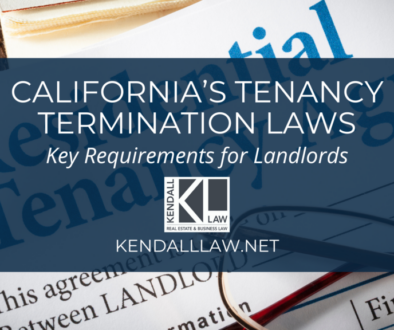New Year, New Laws in Real Estate
Welcome to 2020! With the new year comes new laws. Here are a few of the new laws that you should be aware of relating to real estate and real estate professionals.
90-Day Notice for Rent Increases more than 10 percent: AB 1110 amended civil Code 827(b) to require a 90-day notice (increased from 60 days) when the rent increases over 10 percent. However, landlords/property managers need to be cognizant of the new rent caps associated with AB 1482, which has been codified as Civil Code 1946.2, 1947.12, and 1947.13.
Fair Housing Protection for Short Term Rentals: AB 1497 expands fair housing protections to short term rentals.
Discrimination based on Military status: SB 222 adds “veteran or military status” as a protected class in California. Landlords/property managers are now required to accept Veterans Affairs Supportive Housing vouchers.
Mandatory Section 8: SB 329 prohibits landlords/property managers from denying a tenant based on the tenant’s use of a section 8 voucher.
Service Member Security Deposits: SB 644 amends Civil Code 1950.5 to reduce the amount that a landlord may charge active service members for a security deposit. Effective January 1, 2020. Landlords may not request a security deposit for more than one month’s rent for an unfurnished unit and no more than two month’s rent for a furnished unit. This does not apply if the service member has poor credit or a history of damaging rental units.
Appraisers and Home Inspectors: Home inspectors and appraisers are prohibited from giving an opinion of value on a property except as required to comply with standards set forth in a law or regulation. Business and Professions Code §7196.1 and 7195.7.
Religious Displays on Entry Doors: The law, with some exceptions, prohibits property owners and common interest developments from enforcing or adopting restrictions that prohibit the display of religious items on entry doors or entry door frames of dwellings.
“Home Hardening” and Fire Disclosures: In response to the destruction caused by the wild fires, several laws have been enacted. Home hardening is taking steps to improve the chance of your home and structures withstanding ignition by an inevitable wildfire. Here are the main points:
- Sellers are required to deliver statutory disclosures regarding “home hardening” in high fire areas built before 2010 and the seller is required to list specified retrofits.
- Sellers of property in high fire areas must provide the buyer with documentation stating that the property is in compliance with local laws pertaining to defensible spaces or local vegetation management laws.
- These disclosures are not required if the property is exempt for Transfer Disclosure Statements. TDS three- or five-day cancellation rights apply to these disclosures.
Real Estate Agents are Independent Contractors: The right of real estate agents to be treated as independent contractors has been explicitly reconfirmed.
Accessory Dwelling Units: The new law makes void and unenforceable any covenant, restriction, or condition contained in any deed, contract, security instrument, or other document affecting transfer or sale of property that prohibits or unreasonably restricts the construction or use of an ADU on a lot zoned for single family that meets the certain minimum standards established for those units.
There is also a group of new laws that remove impediments to ADU construction by restricting local jurisdictions’ permitting criteria.
- Major change to facilitate the development of more ADU’s to address barriers to building. It expands categories of ADUs that cities must approve without applying any local development standards to include an 800 square foot detached ADU.
- Removal of impediments to ADU construction by restricting local jurisdictions permitting criteria, clarifying that ADUs must receive streamlined approval if construction in existing spaces and eliminating minimum lot size requirements.
- Prohibits local agencies abilities to require owner-occupancy for five years and eliminates impact fees for ADUs under 750 square feet. For larger ADUs there is a tiered fee structure based on size.
Tenant allowing occupancy of property to person at risk for homelessness: Protections for landlord and tenant when a tenant allows a person to stay in their property due to risk of homelessness, including the ability to remove the person with short notice and police assistance.
Ellis Act: Changes to clarify that owners may not pay prior tenants liquidated damages instead of offering them a chance to re-rent the former unit; and clarify that the date on which the accommodations deemed to have been withdrawn from the rental market is the date on which the final tenancy among all tenants is termination.
FHA Spot Approval: FHA allows approval of individual units even if the project is not FHA approved.
These changes in the law are important areas to incorporate as part of your legal documents and understanding the actions you can/cannot take regarding real estate. Knowing how to interpret the law and where it impacts your real estate choices is critical to avoid costly mistakes.
Author: Eileen Kendall





